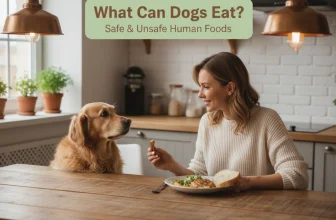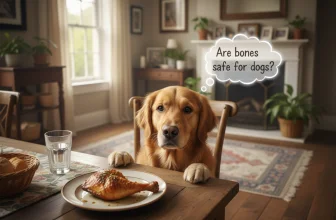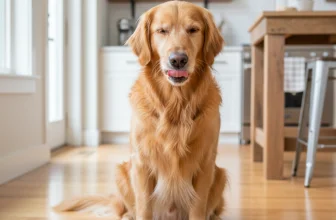Can Dogs Eat Corn? Vet-Approved Guide for Dog Parents
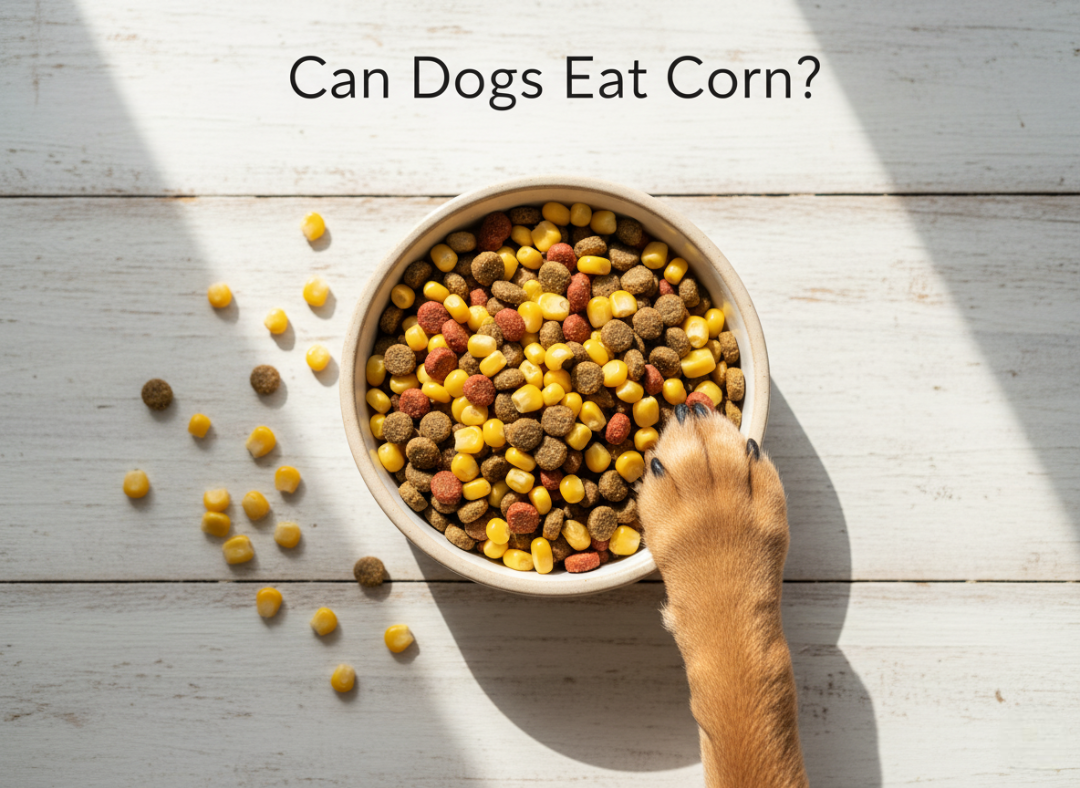
You’re sitting down to dinner, and your dog gives you that hopeful look the one that says, “Just a bite, please?” If corn is on your plate, you might wonder whether sharing a little with your pup is safe. The answer is yes,but only in moderation and the right form.
Let’s break down what every dog parent should know about feeding corn safely, its benefits, possible risks, and how to make sure your furry friend stays healthy.
Let’s explore the benefits, risks, and the right way to feed corn to your dog so you can feel confident about every bite.
Can Dogs Eat Corn?
Yes, dogs can eat corn in small amounts.
Plain, cooked corn kernels (without butter, salt, or seasoning) are safe for most dogs. Corn is actually a common ingredient in many commercial dog foods because it provides energy, fiber, and essential nutrients like vitamins B and magnesium.
However, it’s important to remember that not all forms of corn are safe. Corn on the cob, raw corn, or heavily seasoned corn can cause digestive issues or serious health problems.
Can Dogs Eat Sweet Corn?
Yes, dogs can eat sweet corn too, as long as it’s cooked and served plain. Sweet corn offers the same nutritional benefits as regular corn, it’s rich in carbohydrates, fiber, and natural antioxidants.
Avoid giving your dog canned sweet corn that contains added salt, butter, or cream, as these can upset your dog’s stomach.
A few spoonfuls of plain, boiled sweet corn mixed with their kibble can be a tasty and safe treat.
Can Dogs Eat Cooked Corn?
Cooked corn is the safest way to feed corn to dogs. Boiling or steaming plain corn kernels makes them easier to digest. Avoid using oil, butter, or any seasoning, as these can cause stomach upset or unnecessary calories.
Safe ways to serve cooked corn:
-
Boiled or steamed corn kernels mixed into dog food.
-
A small spoonful of plain cooked corn as a treat.
Unsafe ways to serve corn:
-
Corn on the cob (choking hazard).
-
Grilled corn with butter, salt, or spices.
-
Canned corn with sodium or preservatives.
Nutritional Benefits of Corn for Dogs
Corn can be more than just a filler. It provides real nutritional value when fed responsibly.
1. Carbohydrates for Energy
Corn is a good source of easily digestible carbs that provide quick energy, especially for active dogs.
2. Fiber for Healthy Digestion
The natural fiber in corn helps regulate digestion and can prevent constipation when fed in small amounts.
3. Vitamins and Minerals
Corn contains vitamin B, magnesium, and antioxidants that support a strong immune system, muscle function, and overall vitality.
4. Linoleic Acid for Skin and Coat Health
Corn also provides linoleic acid, an essential fatty acid that helps keep your dog’s skin healthy and their coat shiny.
Is Corn Safe for Dogs?
Yes, cooked corn kernels are safe for most dogs. Corn is often used in many commercial dog foods because it provides valuable nutrients like carbohydrates, fiber, and vitamins.
However, the key is how it’s served.
-
Safe: Plain, cooked, unsalted corn kernels.
-
Unsafe: Corn on the cob, buttered corn, salted, or seasoned corn.
Corn on the cob might seem harmless, but it’s one of the most common causes of intestinal blockages in dogs. Dogs don’t always chew thoroughly, and if they swallow a chunk of cob, it can get stuck in their digestive tract leading to vomiting, pain, and even emergency surgery.
What Corn Is Not Safe for Dogs?
Not all types of corn are dog friendly. Some can cause choking, stomach upset, or worse.
Corn on the Cob:
Even small pieces can block your dog’s intestines. It’s one of the most common reasons dogs end up in emergency vet care.
Seasoned or Buttered Corn:
Garlic, onion powder, butter, and salt can be harmful or toxic to dogs.
Raw Corn:
Dogs can’t properly digest raw kernels, which may cause bloating or discomfort.
Canned Corn with Additives:
Canned corn often contains added sodium and preservatives that can harm your dog’s kidneys or heart over time.
Why Avoid Corn in Dog Food?
Some pet owners prefer to avoid corn-based dog foods because they believe it’s just a filler. The truth is a bit more nuanced.
Corn isn’t inherently bad. It provides energy and nutrients, but some low-quality dog foods use corn as a cheap filler, replacing high-quality proteins. This can reduce the overall nutritional value of the diet.
Additionally, dogs with food allergies or sensitive stomachs may react poorly to corn-based diets. If your dog scratches excessively, has ear infections, or develops loose stool, it’s best to consult your vet about potential grain sensitivities.
So, while corn itself isn’t harmful, it should never be the main ingredient in your dog’s food.
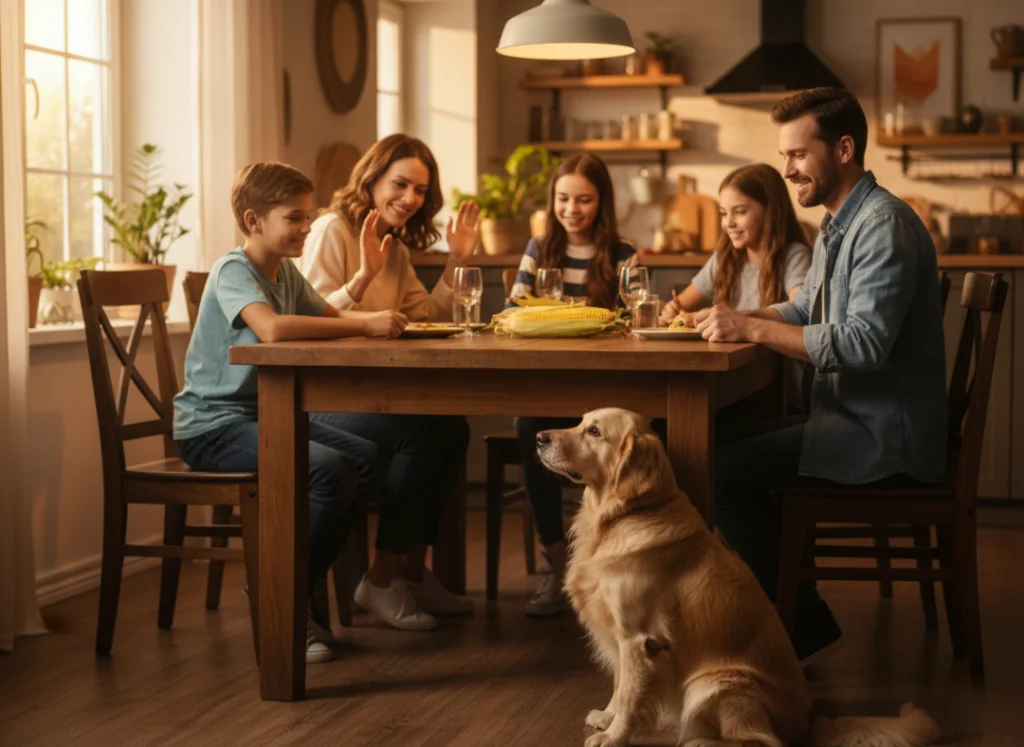
Why Some Dog Parents Worry About Corn
- Many dog owners hesitate to feed corn because of myths that it’s “just a filler” or “hard to digest.” But here’s the truth:
- Corn isn’t a filler when used properly. It provides energy, fiber, and nutrients that support your dog’s health.
- Dogs can digest cooked corn. Unlike raw kernels, cooked corn is broken down easily by a dog’s digestive system.
- Grain allergies are rare. True grain allergies in dogs are uncommon. Most dogs tolerate corn just fine unless they have a specific sensitivity or allergy.
- Still, every dog is different. If your pup shows signs of itching, digestive upset, or ear infections after eating corn, talk to your vet about possible food sensitivities.
What Is the Best Vegetable for a Dog?
Corn is safe in moderation, but there are many other nutrient-rich vegetables that provide more health benefits for dogs.
🥕 Carrots: Great for dental health and packed with beta-carotene.
🥦 Broccoli: High in fiber and antioxidants but should be given in small portions.
🍠 Sweet Potatoes: Rich in vitamins A and C and support digestive health.
🥒 Cucumbers: Low-calorie and hydrating snack for overweight dogs.
🫛 Green Beans: High in fiber and a good filler for weight management diets.
These veggies can often be healthier daily choices than corn and are less likely to trigger allergies.
How to Feed Corn Safely
Here’s how to safely let your dog enjoy corn without worry:
-
Cook It: Boil or steam plain corn kernels never serve raw.
-
No Salt or Seasoning: Dogs don’t need extra sodium or butter.
-
Serve Small Portions: A few spoonfuls mixed into their regular food is plenty.
-
Avoid the Cob: Always remove kernels from the cob before offering.
-
Watch for Reactions: If your dog shows signs of allergy, stop feeding corn and consult your vet.
How Much Corn Can a Dog Eat?
Corn should make up no more than 10% of your dog’s daily diet. Treat it like a snack or a meal topper, not a staple.
Small dogs: 1–2 teaspoons
Medium dogs: 1–2 tablespoons
Large dogs: Up to ¼ cup occasionally
Always monitor for signs of digestive upset after introducing new foods.
Expert Tip
Corn can be a healthy, occasional treat or meal add-in, but it shouldn’t replace your dog’s complete and balanced food. Think of it like a fun side dish, not the main meal.
For most dogs, a few spoonfuls of plain, cooked corn once in a while is perfectly safe and even nutritious. But for dogs with grain allergies or sensitive stomachs, it’s best avoided.
If you’re ever unsure, your veterinarian can help tailor a diet that fits your dog’s unique needs.
FAQs About Dogs and Corn
1. Can dogs eat corn every day?
It’s better not to. Corn should only be given occasionally as a treat, not as part of their daily diet.
2. Can dogs eat popcorn?
Plain, air-popped popcorn is fine in small amounts, but avoid buttered, salted, or flavored popcorn.
3. Can dogs eat cornflakes?
Only in small amounts and without added sugar or milk. Cornflakes offer little nutritional value for dogs.
4. What should I do if my dog eats a corn cob?
Contact your vet immediately. Corn cobs can cause choking or intestinal blockage, which may require surgery.
5. Can puppies eat corn?
Yes, but only tiny amounts of soft, cooked kernels. Puppies have more sensitive stomachs, so introduce it slowly.
Final Thoughts
So, can dogs eat corn?
Yes,but keep it plain, cooked, and occasional. Corn can provide healthy carbs, fiber, and nutrients, but it should never replace your dog’s main food.
Avoid corn on the cob, watch for allergies, and remember that moderation is key. If you want to share corn with your dog, a few plain, cooked kernels are a safe way to make them feel included without risking their health.
Related Reads:


